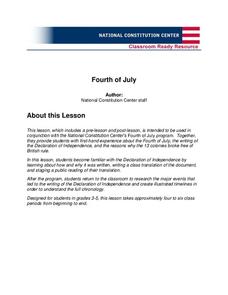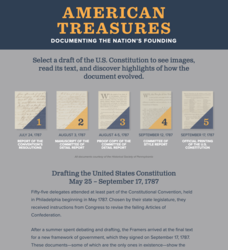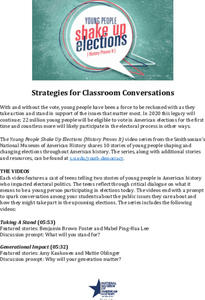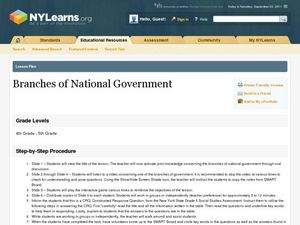Curated OER
Memories from the National Sites
Students write a virtual postcard. In this logo lesson students are introduced to the concept of postcard writing. Students research the national sites and states highlighted on quarters for that year. Students take a virtual trip to the...
Curated OER
The National Motto
Second graders examine the meaning of the national motto, "In God We Trust." In this national motto lesson, 2nd graders explain some of the reasons why people selected the motto for the nation after viewing and discussing a coins and a...
Vietnam Unit III: Student Learning Outcomes (2016)
Overview of Unit III Vietnam War and Peace course, focusing on the transition from Eisenhower to the Kennedy administrations. Students (8-12+) will understand the key geopolitical and internal dynamics shaping Vietnam’s history...
Curated OER
American Focus on World Constitutions
Upper graders read several passages to gain an understanding of the nations that have adopted a constitution similar to the United States Constitution. This is a scripted lesson plan that is intended to build content-specific vocabulary...
Curated OER
End of Mandates and the Middle East
Ninth graders investigate the original mandates of the League of Nations regarding the Middle East. They listen to a lecture/PowerPoint presentation on the end of the mandate system, and complete a fill-in-the-blank worksheet that...
Curated OER
United Nations Lesson Plans
United Nations lesson plans can help students learn about an organization whose mission is to promote peace and security.
Advocates for Human Rights
U.S. Immigration Policy
The United States Immigration Policy is incredibly complex. To gain a deeper understanding of the criteria, quotas, preferences, and categories of immigrants admitted to the US, class members engage in a role playing activity that...
Theodore Roosevelt Association
Roosevelt's Legacy: Conservation
The legacy of Theodore Roosevelt carries through modern American politics, economics, foreign policy, and society. But his proudest and most profound efforts were in the world of conservation, and in preserving the natural beauty of...
National Constitution Center
Fourth of July (Grades 3-5)
Bring history to life for your young scholars with a Fourth of July lesson series. After a class reading of the Declaration of Independence, students translate this pivotal document into layman's terms before working in small...
Library of Congress
Stars, Stripes and Symbols of America: Comparing Our Flag, Past and Present
Your young historians will compare and contrast the details of the American flag today with an an image of the nation's flag from the post-Civil War era, and identify the flag's importance as a national symbol through analysis...
National Constitution Center
American Treasures
Just how long did it take the framers to write the Constitution? What role did the drafting process play? Scholars examine various drafts from the Constitutional Convention to gain a better understanding of its formation. Interactive...
Achieve
Corn and Oats
How much land does a parcel hold? How much fertilizer does it take for a field of corn? Pupils answer these questions and more as they apply ratio reasoning and unit analysis.
Achieve
Yogurt Packaging
Food companies understand how to use math to their advantage. Learners explore the math related to the packaging and serving size of yogurt. They then use unit analysis and percent values to make decisions on the product development.
Center for History and New Media
A Look at Virginians During Reconstruction, 1865-1877
The transition between rebellion to reunification was not smooth after the Civil War. Young historians compare primary and secondary source documents in a study of the Reconstruction era in Virginia, noting the rights that were not...
Smithsonian Institution
Comparing Confederate and Union Soldiers
The Civil War, a war that divided a nation. Comparing and contrasting the Confederate and Union soldiers is not always an easy task, but the eighth of 15 resources makes it easy to teach the concepts. Exercises include watching videos in...
C-SPAN
How A Bill Becomes A Law
Seven steps are required for a bill to become a United States law. The Families First Coronavirus Response Act (H.R. 6201) is used as a model for the process of how a bill becomes a law. Class members work independently through a...
National Endowment for the Humanities
James Madison: Raising an Army—Balancing the States and the Federal Government
To war! To war! Every nation in the history of the world has had to deal with warfare on some level. Scholars go through a series of activities and discussions surrounding the development of the Constitution to help them better...
Smithsonian Institution
Young People Shake Up Elections (History Proves It) Educator Guide
Vote, it's your civic duty! The resource provides several videos about voting in the United States. Scholars watch a series of topics ranging from youth participation to civic action. The educator's guide provides teachers with...
Curated OER
How Has the Constitution Shaped the Economic System in the United States?
Students examine the characteristics of market economies. In this United States economics lesson, students analyze the Constitution to understand how it contributes to the market economy established in the United States. Students...
Curated OER
Our National Symbol
Students identify the bald eagle as the national symbol of the United States and explain what the symbol represents. They work to create their own symbol and explain why their created symbol is an appropriate representation of the United...
Curated OER
1968: Year of Social Change and Turning Point in Vietnam and the United States
Eleventh graders examine the year 1968 in Vietnam and the United States. They work together to research events which they create a timeline. They also read primary source documents of veterans of the Vietnam War.
Curated OER
United States All the Way
Pupils create patriotic books about the United States and some of its special symbols.
Curated OER
Democracies in North America: Canada, the United States, and Mexico
Pupils examine democratic values. In this democracy lesson, students research the political systems of Canada, Mexico, and the United States in order to compare and contrast them. Pupils also discuss domestic and international events...
Curated OER
Branches of National Government
Students view video clips and play a game to teach them about the three branches of the National Government. In this government lesson plan, students use the SMART Board, their notebook, and slides.























